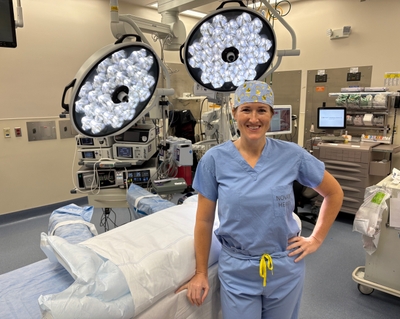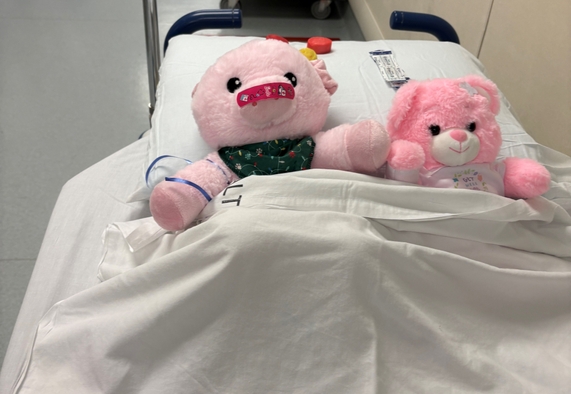If you think everyone dreads surgery, you’ve forgotten about the first time your childhood self heard about a friend getting their tonsils out.
That friend was going into the hospital for something called surgery and was going to get all the ice cream she could eat once it was over. Suddenly, you were begging your parents for an operation.

The team at the recently opened Novant Health Pediatric Surgery - Elizabeth in Charlotte, including pediatric surgeons Dr. Heather Nolan and Dr. Tuan Pham, has a knack for making a hospital stay seem like an adventure. Even if mountains of ice cream aren’t part of the deal.
And more good news, Moms and Dads: Kids bounce back from surgery faster than adults do, Nolan said.
We talked to Nolan about the surgeries she and her partners perform and what kids and parents can expect before, after and on the day of surgery.
Get the best possible outcome for your child.
How does Novant Health help a child and their parents prepare for surgery?
It all starts with a good conversation. We let the patient and their family know what surgery will look like, what the risks and benefits are, what the day of surgery will look like and what they can expect after surgery.
Tell me about your office culture and environment
Our team is excited about our office and we’re doing a lot toward making it a fun place for kids to visit. As a big kid myself, I really like it. Of course, we also have serious conversations here, so we’re set up for those, too.
I’ve heard about something specific to pediatrics called “Child Life specialists.” How do they play a role in helping children undergoing surgery?
Our Child Life specialists are an amazing resource for kids. They frame the experience in a child-friendly way that makes it understandable and easier to process. Surgery isn’t some scary unknown but something that can be kind of fun. The Child Life specialist goes into the OR with the child. They have lots of techniques and gadgets – toys, stickers – to engage kids throughout the process.
What ages of children do you operate on?
We operate on all children – from infants who are a few months’ premature up to 18 years old.
Before any surgery, there’s a consultation, right? Tell me what that involves.
At a surgical consultation, we want to get to know you and for you to get to know us. It’s the time to ask all your questions. Most of our fear and anxiety related to surgery comes from the unknown. So we, as a pediatric surgery team, are committed to answering all your questions to try to erase any fear.

Each consult is different, and we take each case individually because no two kids are the same. But in general, we talk about the reason for the referral and what the next steps are. For a good number of kids, it’s surgery. But not always.
We may need additional imaging studies or lab work, or we may determine it’s not the right time for surgery. In that case, we might delay until the child is older or watch the condition and discuss surgery if something changes.
In other words: A consultation doesn’t mean surgery is inevitable.
We always ask: What will help the child the most? We never try to push surgery on anyone. We want you to understand the reasons behind it and for the decision to be yours.
At what age is it appropriate for the child to be part of that consult?
Oh, the child is part of every consult. We’ll frame the conversation so that it’s age-appropriate. Even if a child is too young to fully understand what's going on, they like being involved.
Why should parents choose Novant Health if their child needs an operation?
Because we take care of patients and their families as if they were our own. We know how important communication is, and we want you to feel right at home with your surgical team. We use our knowledge, training and expertise to provide the best possible care, but we also have a heart for children that shines through in everything we do. At Novant Health, you don’t just get quality; you also get compassion.Since you mentioned training, tell me about yours.

I did four years of undergraduate, four years of medical school and then five years in general surgery residency training, plus two more years doing a fetal surgery fellowship along with a Master of Science. Finally, I did two additional years of a general pediatric surgery fellowship.
Tell me about the difference in operating on children and adults.
Children differ from adults physiologically, so they respond to disease processes, surgery and anesthesia differently than adults might. They are not just mini-adults and often require their own specialized strategies. When it comes to surgery itself, children’s organs are smaller. We need finer instrumentation and more delicate handling. And, given the size of the anatomy or tissue, we’ll use different techniques than you would on an adult.
What’s recovery like for most children after surgery?
Kids are more resilient than a lot of adults give them credit for. They bounce back from surgery faster than adults. They love to play and explore, so even when they have surgery, they want to get better quickly. Some surgeries, obviously, take quite a while to recover from, but I've had some parents tell me that the day after surgery, their kids were already back to their normal, cheerful, smiling selves.
What are some surgeries you perform?
We’re general surgeons, which means we cover just about everything from kids with cancer to emergency surgeries on newborns to elective cases that come through our clinic.
We take care of a variety of conditions, such as:
- Lumps and bumps of the skin and soft tissue that might need to be removed or biopsied.
- Removal of organs such as the appendix or gallbladder, which we perform in a minimally invasive technique – sometimes with just one incision.
- Repair of hernias of all types including belly button (umbilical) and groin (inguinal).
- Procedures on the intestine.
- Abnormalities of the lungs.
- Many more; too numerous to list.
Tell me about some complex surgeries you perform.
There are a lot. The complexity can be related to a few different factors:- The size of the patient. Babies born a couple of months early may weigh less than 2 pounds, and that’s one kind of complexity.
- The process. Operating on a child with a tumor taking up the majority of their abdomen is going to be very complex.
- The surgery itself. We’ve operated on babies born without an anus or without their intestines connected to one another, and having to go in and recreate something like that can make for a more complex surgery.
Can you correct those conditions in just one surgery? Or does it take a series?
It depends on the condition they have. But no matter what the case, we talk the family through it.
Tell me about single-incision surgery, when you use it and what the benefits are.
Single-incision surgery takes laparoscopic surgery – which is typically three to five small incisions and involves inserting a camera and instruments through those incisions – to a new level. It’s just one small incision, typically hidden in the belly button. Kids tend to have improved postoperative pain control with it, and some parents tell me afterward they can’t even see the scar.
Thank you. Anything else you want to share?
Just that everybody on our team is friendly and has the right personality to relate to kids and make them comfortable and at ease with something that’s out of their normal routine. We all love what we do.










